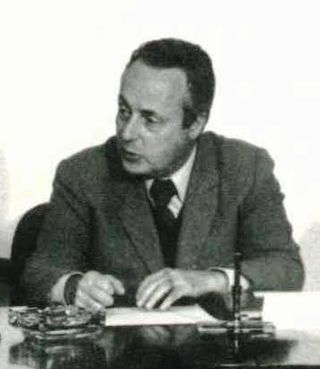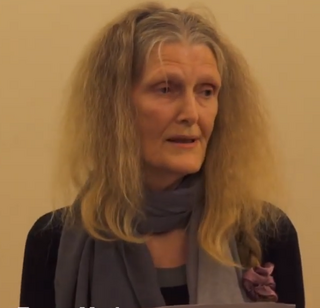Related Research Articles

Giorgio Bassani was an Italian novelist, poet, essayist, editor, and international intellectual.

Freya Mathews is an Australian environmental philosopher whose main work has been in the areas of ecological metaphysics and panpsychism. Her current special interests are in ecological civilization; indigenous perspectives on "sustainability" and how these perspectives may be adapted to the context of contemporary global society; panpsychism and critique of the metaphysics of modernity; and wildlife ethics and rewilding in the context of the Anthropocene.
Ecocriticism is the study of literature and ecology from an interdisciplinary point of view, where literature scholars analyze texts that illustrate environmental concerns and examine the various ways literature treats the subject of nature. It was first originated by Joseph Meeker as an idea called "literary ecology" in his The Comedy of Survival: Studies in Literary Ecology (1972).
The environmental humanities is an interdisciplinary area of research, drawing on the many environmental sub-disciplines that have emerged in the humanities over the past several decades, in particular environmental literature, environmental philosophy, environmental history, science and technology studies, environmental anthropology, and environmental communication. Environmental humanities employs humanistic questions about meaning, culture, values, ethics, and responsibilities to address pressing environmental problems. The environmental humanities aim to help bridge traditional divides between the sciences and the humanities, as well as between Western, Eastern, and Indigenous ways of relating to the natural world and the place of humans within it. The field also resists the traditional divide between "nature" and "culture," showing how many "environmental" issues have always been entangled in human questions of justice, labor, and politics. Environmental humanities is also a way of synthesizing methods from different fields to create new ways of thinking through environmental problems.

Raffaele La Capria was an Italian novelist and screenwriter.

David Abram is an American ecologist and philosopher best known for his work bridging the philosophical tradition of phenomenology with environmental and ecological issues. He is the author of Becoming Animal: An Earthly Cosmology (2010) and The Spell of the Sensuous: Perception and Language in a More-than-Human World (1996), for which he received the Lannan Literary Award for Nonfiction. Abram is founder and creative director of the Alliance for Wild Ethics (AWE); his essays on the cultural causes and consequences of ecological disarray have appeared often in such journals as the online magazine Emergence, Orion, Environmental Ethics, Parabola, Tikkun and The Ecologist, as well as in numerous academic anthologies.
Anthony Julian Tamburri is the seventh executive director and longest serving with the title of Dean of the John D. Calandra Italian American Institute of Queens College, CUNY and Distinguished Professor of European Languages and Literatures. He has written over one hundred journal articles and book chapters, and sixteen books.
Greta Gaard is an ecofeminist writer, scholar, activist, and documentary filmmaker. Gaard's academic work in the realms of ecocriticism and ecocomposition is widely cited by scholars in the disciplines of composition and literary criticism. Her theoretical work extending ecofeminist thought into queer theory, queer ecology, vegetarianism, and animal liberation has been influential within women's studies. A cofounder of the Minnesota Green Party, Gaard documented the transition of the U.S. Green movement into the Green Party of the United States in her book, Ecological Politics. She is currently a professor of English at University of Wisconsin-River Falls and a community faculty member in Women's Studies at Metropolitan State University, Twin Cities.
Nicola Tanda was an Italian philologist and literary critic. He studied under Ungaretti and Sapegno at Rome. He was for over thirty years professor at the University of Sassari, first specialising in Italian literature, and then later in Sardinian philology and Sardinian literature. He was a leading advocate for minority languages and their literary expression in the island of Sardinia, including the Sardinian language and Algherese Catalan. As such he was an honorary member of ANPOSDI. He wrote the new Philology of Italians based on the European Charter for Regional or Minority Languages. He was founder and president of the Sardinian PEN Club. He was president of the jury of the Premio Ozieri literary prize founded in 1956 to promote new works composed in Sardinian tongues. He founded in 2003 the Centre for Study of Sardinian Philology. As an editor/director he has guided the publication of over 100 volumes written in Sardinian languages.

Ecofeminism is a branch of feminism and political ecology. Ecofeminist thinkers draw on the concept of gender to analyse the relationships between humans and the natural world. The term was coined by the French writer Françoise d'Eaubonne in her book Le Féminisme ou la Mort (1974). Ecofeminist theory asserts a feminist perspective of Green politics that calls for an egalitarian, collaborative society in which there is no one dominant group. Today, there are several branches of ecofeminism, with varying approaches and analyses, including liberal ecofeminism, spiritual/cultural ecofeminism, and social/socialist ecofeminism. Interpretations of ecofeminism and how it might be applied to social thought include ecofeminist art, social justice and political philosophy, religion, contemporary feminism, and poetry.
Jane Bennett is an American political theorist and philosopher. She is the Andrew W. Mellon Professor of the Humanities at the Department of Political Science, Johns Hopkins University School of Arts and Sciences. She was also the editor of the academic journal Political Theory between 2012 and 2017.
Maurice Samuels is the Betty Jane Anlyan Professor of French at Yale University. He graduated with a BA in 1990 from Harvard University, where he also earned his MA (1995) and PhD (2000). Before moving to Yale in 2006, Samuels taught at the University of Pennsylvania. He specializes in the literature and culture of nineteenth-century France and in Jewish Studies, and is the author of books and articles on these and other topics. He is the inaugural director of the Yale Program for the Study of Antisemitism.
Ecofiction is the branch of literature that encompasses nature or environment-oriented works of fiction. While this super genre's roots are seen in classic, pastoral, magical realism, animal metamorphoses, science fiction, and other genres, the term ecofiction did not become popular until the 1960s when various movements created the platform for an explosion of environmental and nature literature, which also inspired ecocriticism. Ecocriticism is the study of literature and the environment from an interdisciplinary point of view, where literature scholars analyze texts that illustrate environmental concerns and examine the various ways literature treats the subject of nature. Environmentalists have claimed that the human relationship with the ecosystem often went unremarked in earlier literature.
Joni Adamson is an American literary and cultural theorist. She is considered one of the main proponents of environmental justice and environmental literary criticism, or Ecocriticism. She is a professor of the environmental humanities and senior sustainability scholar at Arizona State University in Arizona. In 2012–13, she served as president of the Association for the Study of Literature and Environment (ASLE), the primary professional organization for environmental literary critics. From 1999 to 2010, she founded and led the Environment and Culture Caucus of the American Studies Association (ASA-ECC).
Catriona Sandilands is a Canadian writer and scholar in the environmental humanities. She is most well known for her conception of queer ecology. She is currently a Professor in the Faculty of Environmental Studies at York University. She was a Canada Research Chair in Sustainability and Culture between 2004 and 2014. She was a Fellow of the Pierre Elliott Trudeau Foundation in 2016. Sandilands served as president of the Association for the Study of Literature and Environment in 2015. She is also a past President of the Association for Literature, Environment, and Culture in Canada (ALECC) and the American Society for Literature and the Environment (ASLE).
Michael P. Branch is an ecocritic, writer, and humorist with over three hundred publications, including work in The Best American Essays, The Best American Science and Nature Writing and The Best American Nonrequired Reading. An important member of the environmental and writing community, Western American Literature has described him as part of the "enduring procession of outdoor journalists."
Ecomafia is an Italian neologism for criminal activities related to organized crime which cause damage to the environment. The term was coined by the Italian environmentalist organization Legambiente in 1994, and has since seen widespread use. In Italy, environmental crime is one of the fastest growing and most profitable forms of criminal activity. As of 2012, an estimated 30% of Italy's waste is disposed of illegally by organized crime syndicates. The United Nations Environment Programme estimated that criminal organizations earned approximately $20–30 billion USD from environmental crimes.
Eli Clare is an American writer, activist, educator, and speaker. His work focuses on queer, transgender, and disability issues. Clare was one of the first scholars to popularize the bodymind concept.
Catherine Elizabeth Rigby is a scholar in the interdisciplinary field of environmental humanities.
Sharon Kinoshita is a professor of medieval literature, and co-director of the UCSC Center for Mediterranean Studies at UC Santa Cruz. In 2016, she published a new translation of Marco Polo's 'Description of the World', from the Franco-Italian 'F' version of the text. In 2023, she was elected a Fellow of the Medieval Academic of America.
References
- ↑ "La Stampa - Ecocritica, ovvero della letteratura ecologica". Archived from the original on 18 January 2014. Retrieved 30 April 2016.
- ↑ "Profilo del docente: Serenella Iovino - Dipartimento di Lingue e Letterature Straniere". dipartimentolingue.unito.it. Retrieved 30 April 2016.
- ↑ "Serenella Iovino - Rachel Carson Center for Environment and Society - LMU Munich". carsoncenter.uni-muenchen.de. Retrieved 30 April 2016.
- ↑ "University of California, San Diego, lecture". italoamericano.org. Retrieved 30 April 2016.
- ↑ "Preconference Seminar - Tenth Biennial ASLE Conference - May 28 to June 1, 2013". asle.ku.edu. Retrieved 30 April 2016.
- ↑ "Aldo and Jeanne Scaglione Prize for Italian Studies Winners". Modern Language Association. Retrieved 26 February 2021.
- 1 2 "Book Prizes Awarded". aais.wildapricot.org. American Association for Italian Studies. 2016. Archived from the original on 20 June 2019. Retrieved 19 June 2023.
20th and 21st centuries: Serenella Iovino. Ecocriticism and Italy: Ecology, Resistance, and Liberation. New York: Bloomsbury, 2016.
- ↑ Lollini, Massimo (2020). "Italy and the Environmental Humanities: Landscapes, Natures, Ecologies by Serenella Iovino, Enrico Cesaretti, and Elena Past (review)". MLN. 135 (1): 354–356. doi:10.1353/mln.2020.0008. S2CID 219459154. Project MUSE 754957.
- ↑ Tait, A. G. (2 January 2019). "Environmental humanities: voices from the Anthropocene". Green Letters. 23 (1): 105–108. doi:10.1080/14688417.2019.1586134. S2CID 166312720.
- ↑ "Environmental Humanities: Voices from the Anthropocene - ASLE" . Retrieved 26 February 2021.
- ↑ Banting, Pamela (2018). "Environmental Humanities: Voices from the Anthropocene by Serpil Oppermann and Serenella Iovino". The Goose. 16 (2).
- ↑ Barron, Patrick. "Review of Ecocriticism and Italy: Ecology, Resistance, Liberation, by Serenella Iovino".
{{cite journal}}: Cite journal requires|journal=(help) - ↑ Guaraldo, Emiliano (29 December 2016). "L'ecocritica in Italia: ambiente, letteratura, nuovi materialismi. A proposito dei volumi di S. Iovino, Ecocriticism and Italy: Ecology, Resistance, and Liberation (2016) e di N. Turi (a cura di), Ecosistemi letterari (2016)". LEA (in Italian). 5: 671–699. doi:10.13128/LEA-1824-484X-20060.
- ↑ Stenning, Anna (3 May 2016). "Material ecocriticism , edited by Serenella Iovino and Serpil Oppermann, Bloomington and Indianapolis, Indiana University Press, 2014, 376 pp., US$40 (paperback), ISBN 978-0-253-01398-9". Green Letters. 20 (2): 218–220. doi:10.1080/14688417.2016.1171490. S2CID 164165388.
- ↑ LaFleur, Greta (2018). "Material Ecocriticism ed. by Serenella Iovino and Serpil Oppermann (review)". PhiloSOPHIA. 8 (1): 157–162. doi:10.1353/phi.2018.0011. S2CID 171948682. Project MUSE 694770.
- ↑ "Ecologia Letteraria | Serenella Iovino". Zest Letteratura Sostenibile (in Italian). 14 January 2018. Retrieved 26 February 2021.
- ↑ "ECOLOGIA LETTERARIA. UNA STRATEGIA PER LA SOPRAVVIVENZA – Fermi EcoSpace" (in Italian). Retrieved 26 February 2021.
- ↑ "Aldo and Jeanne Scaglione Prize for Italian Studies Winners". Modern Language Association. Retrieved 29 April 2021.